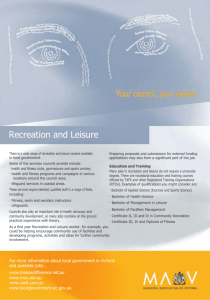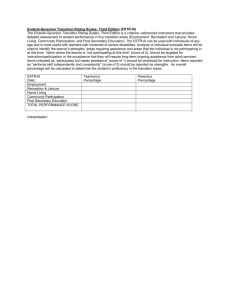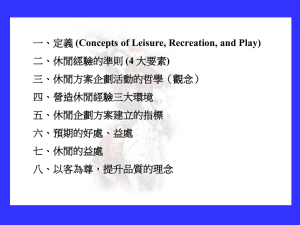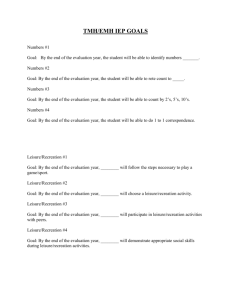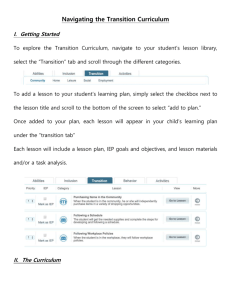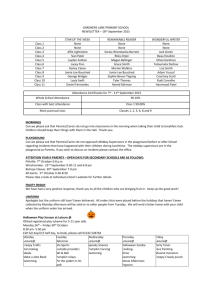*****DUE DATE : 28 MARCH 2013***** 2013 LARASA Congress
advertisement
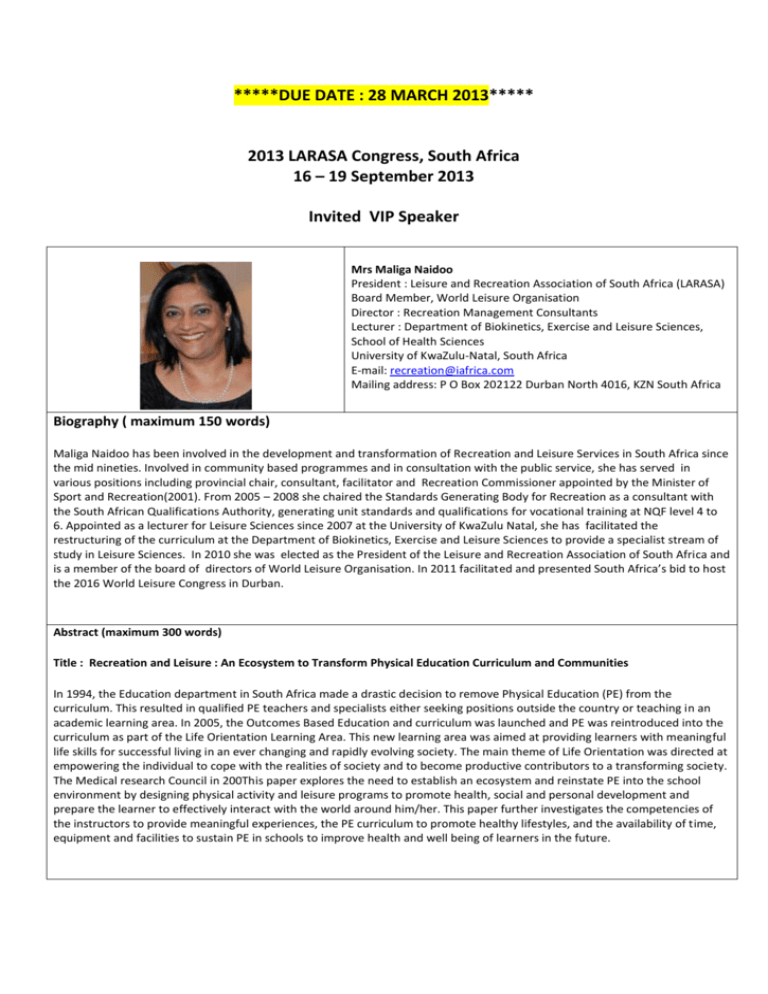
*****DUE DATE : 28 MARCH 2013***** 2013 LARASA Congress, South Africa 16 – 19 September 2013 Invited VIP Speaker Mrs Maliga Naidoo President : Leisure and Recreation Association of South Africa (LARASA) Board Member, World Leisure Organisation Director : Recreation Management Consultants Lecturer : Department of Biokinetics, Exercise and Leisure Sciences, School of Health Sciences University of KwaZulu-Natal, South Africa E-mail: recreation@iafrica.com Mailing address: P O Box 202122 Durban North 4016, KZN South Africa Biography ( maximum 150 words) Maliga Naidoo has been involved in the development and transformation of Recreation and Leisure Services in South Africa since the mid nineties. Involved in community based programmes and in consultation with the public service, she has served in various positions including provincial chair, consultant, facilitator and Recreation Commissioner appointed by the Minister of Sport and Recreation(2001). From 2005 – 2008 she chaired the Standards Generating Body for Recreation as a consultant with the South African Qualifications Authority, generating unit standards and qualifications for vocational training at NQF level 4 to 6. Appointed as a lecturer for Leisure Sciences since 2007 at the University of KwaZulu Natal, she has facilitated the restructuring of the curriculum at the Department of Biokinetics, Exercise and Leisure Sciences to provide a specialist stream of study in Leisure Sciences. In 2010 she was elected as the President of the Leisure and Recreation Association of South Africa and is a member of the board of directors of World Leisure Organisation. In 2011 facilitated and presented South Africa’s bid to host the 2016 World Leisure Congress in Durban. Abstract (maximum 300 words) Title : Recreation and Leisure : An Ecosystem to Transform Physical Education Curriculum and Communities In 1994, the Education department in South Africa made a drastic decision to remove Physical Education (PE) from the curriculum. This resulted in qualified PE teachers and specialists either seeking positions outside the country or teaching in an academic learning area. In 2005, the Outcomes Based Education and curriculum was launched and PE was reintroduced into the curriculum as part of the Life Orientation Learning Area. This new learning area was aimed at providing learners with meaningful life skills for successful living in an ever changing and rapidly evolving society. The main theme of Life Orientation was directed at empowering the individual to cope with the realities of society and to become productive contributors to a transforming society. The Medical research Council in 200This paper explores the need to establish an ecosystem and reinstate PE into the school environment by designing physical activity and leisure programs to promote health, social and personal development and prepare the learner to effectively interact with the world around him/her. This paper further investigates the competencies of the instructors to provide meaningful experiences, the PE curriculum to promote healthy lifestyles, and the availability of time, equipment and facilities to sustain PE in schools to improve health and well being of learners in the future. CONFERENCE THEME : LEISURE, SOCIAL COHESION AND TRANSFORMATION The theme highlights the contemporary global socio-political issues and challenges we face in delivering recreation and leisure programs to communities, building sustainable and responsible tourism , improving the health and human condition of citizens, transforming youth by promoting activities which contribute to human development, and to the creation of sustainable cities by focusing on environmental sustainability and the built environment. SUB THEMES FOCUS AREAS Health and Wellbeing promoting Physical Activity, alternative therapies, healthy / active living, non-communicable diseases, employee wellbeing, HIV/Aids, obesity Built Environment / Environmental awareness includes landscaping, trails, transportation, planning for a leisure city, sustainable cities, preservation of open spaces, obesity, physical activity Therapeutic Recreation / Recreation Therapy / Disabilities Social advocacy and systems change, inclusion, mainstreaming, Youth development Resiliency, boosting self esteem and confidence, correctional services, campus recreation, human development Women, Children, Minority groups gender equity, play, families, culture, race Parks and playgrounds Outdoor adventure, playground audits, playground design / inclusive playgrounds, playground safety inspectors Tourism Eco-tourism, Agri-tourism, culture, heritage, creative arts, theatre, music, dance, travel Economic Benefits Contribution of leisure to economic growth Leisure and Society Social networks, social justice, developing social capital, Human dignity, equity and freedom, human rights, psychological wellbeing, poverty alleviation Technology Promoting physical activity through technological advances, ecosystems Leisure Education Theories, experiential learning, curriculum development, skills development, Leisure and Sport Management Organizational development, policy and strategic planning, implementation of services. risk management, municipal best practice, good governance,

